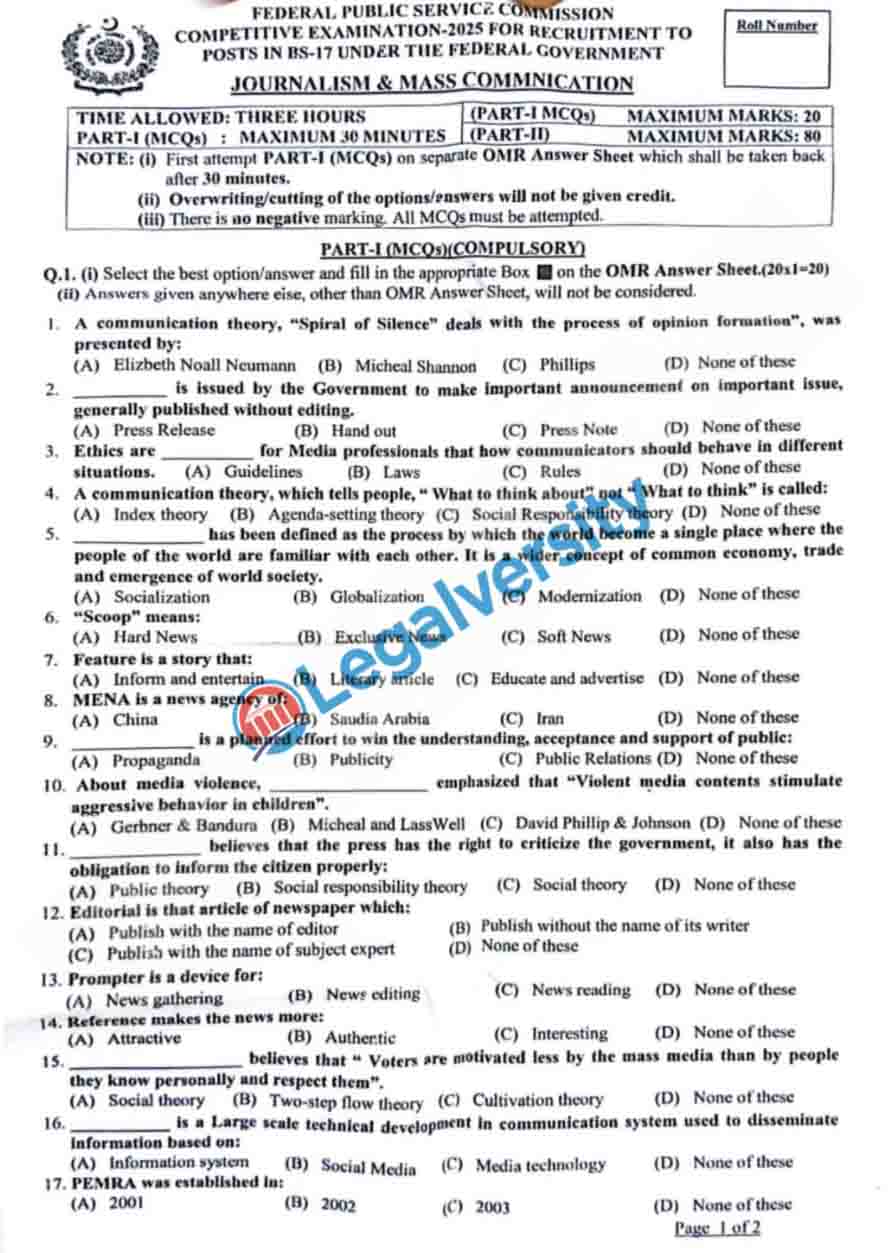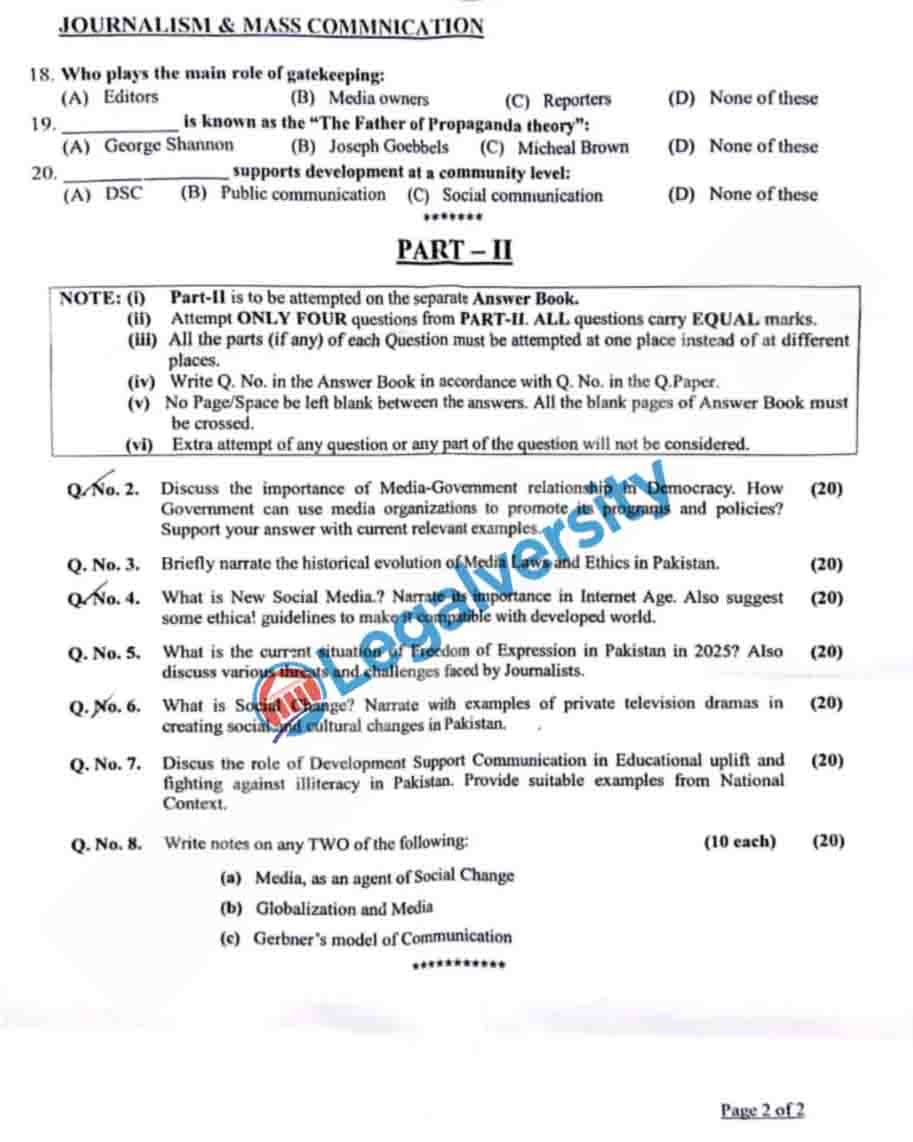The paper of Journalism & Mass Communication is an optional subject in the CSS competitive examination 2025. Here, you will find the CSS Journalism & Mass Communication past Paper 2025. I will also provide a summary of the paper, in which you will analyze what topics were given and how difficult they were. This lets you better understand the paper and prepare well for future examinations.
CSS Journalism & Mass Communication Past Paper 2025
Q1. Discuss the importance of the Media-Government relationship in Democracy. How government can use media organizations to promote its programs and policies? Support your answer with current relevant examples.
Q2. Briefly narrate the historical evolution of Media Laws and Ethics in Pakistan.
Q3. What is New Social Media? Narrate its importance in the Internet Age. Also, suggest some ethical guidelines to make it compatible with the developed world.
Q4. What is the current situation of Freedom of Expression in Pakistan in 2025? Also, discuss various threats and challenges faced by Journalists.
Q5. What is Social Change? Narrate with examples of private television dramas in creating social and cultural changes in Pakistan.
Q6. Discuss the role of Development Support Communication in Educational uplift and fighting against illiteracy in Pakistan. Provide suitable examples from the National Context.
Q7. Write notes on any two of the following:
- Media, as an agent of social change.
- Globalization and Media
- Gerbner’s model of communication
Critical Analysis of the Paper
This paper critically analyzes the nexus of media, governance, democracy, and social change, challenging candidates on theoretical as well as practical dimensions of communication. It calls for an appreciation of historical development, current challenges, and future trajectories of media impact in Pakistan and globally.
The second question examines the relationship between government and media in a democratic context, focusing on how governments can strategically utilize media to spread policies, influence public opinion, and ensure transparency. The question requires practical examples, like the employment of online campaigns for public awareness or government-controlled media narratives. As the global media landscape continues to change, the response must find a balance between governmental power and the watchdog role of the media, allowing for democratic accountability.
The evolution of media laws and ethics in Pakistan over time (Q2) is important to analyze how legislative developments have influenced press freedom and regulation. The answer needs to understand the media censorship, the role of PEMRA, martial law periods’ contribution, and new digital regulations impacting press freedom and journalistic ethics.
The New Social Media question (Q3) is an inquiry into the transition from mainstream media to user-generated sites, digital discourse, and dissemination of information in real time. Ethical principles are most applicable when Pakistan is confronting fake news, political propaganda, and cyber harassment, and there is a need for policy recommendations in consonance with international standards.
Freedom of expression (Q4) is a sensitive and intricate subject in Pakistan. Candidates are required to comment on restraint on the press, laws of censorship, assault on media workers, and the role of state and non-state actors in media. The discussion is to include new challenges of 2025, demonstrating the presence of active curbs, cyber legislation, and media suppression.
The social change question (Q5) is a cultural one, which demands an analysis of how private TV dramas have impacted society’s norms. The question evaluates the candidate’s skill in analyzing the media’s impact on changing gender roles, political consciousness, and moral issues, through common examples from the history of Pakistani television.
The development communication role (Q6) emphasizes the media’s role in education and literacy, especially through televised educative programs, online learning activities, and mass awareness drives. The candidates are expected to give specific examples, like government-backed educative broadcasts and NGO-sponsored literacy schemes to explain the media’s developmental role.
The short notes section assures the media’s role in globalization, social change, and theoretical models of communication, challenging conceptual understanding in concise but perceptive answers.
Generally, this paper requires a critical, research-oriented, and analytical approach, with candidates having to link historical background, current issues, and future media trends and deal with democracy, governance, ethics, and social influence.
View the CSS Mass Communication past paper 2025


Also read:
